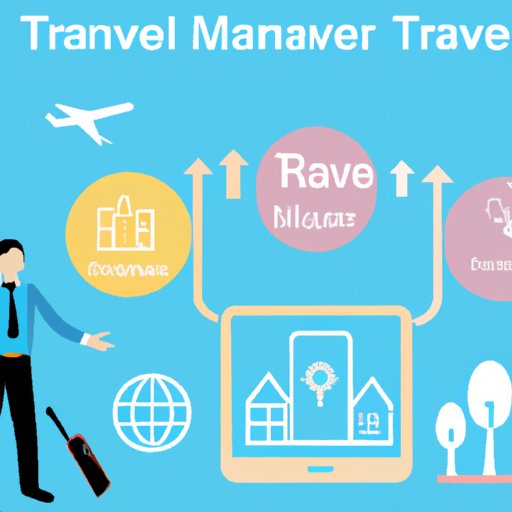Introduction
Travel management is the process of managing all aspects of an organization’s travel needs. It includes planning, booking, and managing business trips for employees, as well as overseeing the budget for these trips and ensuring that they are compliant with company policies. The goal of travel management is to reduce costs and increase efficiency while providing a safe and comfortable journey for travelers.
What is Travel Management and How Can It Help Your Business?
Travel management is a critical component of any business’s operations. By implementing a comprehensive travel management system, companies can reduce their travel costs and improve the efficiency of their travel processes. In addition, by understanding the roles and responsibilities of travel managers, businesses can ensure that their trips are managed in a way that is both cost-effective and compliant with company policies.

An Introduction to Travel Management: What You Need to Know
Travel management involves the planning, booking, and managing of business trips for employees. This includes researching and selecting destinations, booking flights, hotels, and other travel services, and managing the budget for the trip. It also involves ensuring that the trip is compliant with company policies and procedures.
The role of technology in travel management has become increasingly important in recent years. Technology solutions such as online booking systems, automated expense tracking, and mobile apps have made it easier for companies to manage their travel processes. Additionally, many companies are now leveraging artificial intelligence (AI) and machine learning (ML) to automate some of the more tedious tasks associated with travel management.
Implementing a travel management system is essential for businesses looking to reduce costs and improve efficiency. A good travel management system should include features such as automated expense tracking, real-time notifications, and reporting tools. Additionally, a good travel management system should be able to integrate with existing systems and processes within the business.

Understanding the Role of Travel Managers in Businesses
The role of a travel manager is to oversee the entire travel process and ensure that it is efficient and cost-effective. Travel managers are responsible for researching and selecting destinations, booking flights, hotels, and other travel services, and managing the budget for the trip. They must also ensure that the trip is compliant with company policies and procedures.
In addition to managing internal travel, travel managers often work with external travel resources such as suppliers and vendors. They may negotiate discounts and special offers with these partners, as well as monitor their performance and ensure that they are meeting the company’s standards.
The Basics of Travel Management: How to Reduce Costs and Improve Efficiency
Travel management is about more than just booking flights and hotels. It’s about finding ways to reduce costs and improve efficiency. There are several strategies that businesses can use to reduce their travel costs, such as negotiating discounts and special offers with suppliers and vendors, leveraging automation to streamline processes, and using data analysis to identify areas where further savings can be made.
Leveraging automation is another key way to reduce costs and improve efficiency. Automation can help to streamline processes such as expense tracking, booking, and reporting. Additionally, AI and ML can be used to automate more complex tasks, such as predicting demand and recommending the best options for travelers.
How to Use Technology to Streamline Your Travel Management Process
Technology plays an important role in travel management. Companies can use technology solutions such as online booking systems, automated expense tracking, and mobile apps to streamline their travel processes. Additionally, AI and ML can be used to automate more complex tasks, such as predicting demand and recommending the best options for travelers.
Integrating technology into your travel process is also essential for improving efficiency. By integrating existing systems and processes within the business, companies can ensure that their travel management system is up-to-date and responsive to changes in the market. Additionally, companies can leverage data analysis to identify areas where further savings can be made.

The Growing Importance of Travel Management for Companies
Travel management is becoming increasingly important for companies of all sizes. By adopting best practices for travel management, businesses can reduce their travel costs and improve the efficiency of their travel processes. Additionally, companies can benefit from improved customer satisfaction and increased employee productivity.
Analyzing the benefits of travel management is essential for any business looking to optimize their travel processes. Adopting best practices for travel management can help companies reduce their travel costs, improve efficiency, and ensure compliance with company policies. Additionally, companies can benefit from improved customer satisfaction and increased employee productivity.
Conclusion
Travel management is a critical component of any business’s operations. By understanding the roles and responsibilities of travel managers, businesses can ensure that their trips are managed in a way that is both cost-effective and compliant with company policies. Additionally, by leveraging technology and best practices, businesses can reduce their travel costs and improve the efficiency of their travel processes.
By implementing a comprehensive travel management system, companies can reduce their travel costs and increase efficiency while providing a safe and comfortable journey for travelers. Understanding the basics of travel management, such as how to reduce costs and improve efficiency, is essential for any business looking to optimize their travel processes.
(Note: Is this article not meeting your expectations? Do you have knowledge or insights to share? Unlock new opportunities and expand your reach by joining our authors team. Click Registration to join us and share your expertise with our readers.)
